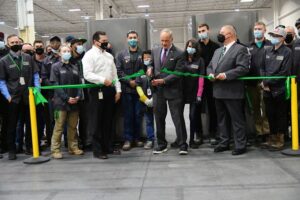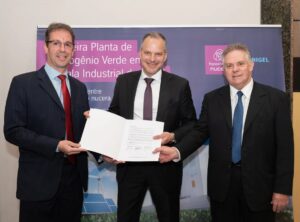The CDE™ can make and test readily available catalyst materials 10,000 times faster than any other method. This breakthrough in speed is significant as the planet has only about one-tenth the iridium it needs to meet the rapidly growing global demand for hydrogen electrolyzers.
Using only water and renewable electricity, electrolyzers can produce green hydrogen, a carbon-free fuel capable of addressing many of today’s clean energy needs. To produce hydrogen, electrolyzers split water into its components: hydrogen and oxygen. But to make this reaction happen, electrolyzers require catalysts. These catalysts are a key element of the hydrogen production process. H2U is leveraging its CDE to develop a suite of novel catalysts that could replace expensive, rare materials like iridium.
The CDE is a rapid screening process developed over ten years at the California Institute of Technology (Caltech) through a USD 122 million Department of Energy grant. This data-driven, high-throughput process allows scientists to make, characterize, and quantify the catalytic activity of thousands of material compositions per week. H2U scientists then close the loop with big data analysis to refine and guide the search for the optimum catalysts in a continuing improvement cycle. With this patented technology, H2U believes to hold the key to enabling the hydrogen economy.
“Our Catalyst Discovery Engine is a major breakthrough in testing and identifying non-PGM catalyst materials,” said Mark McGough, CEO of H2U Technologies. “The CDE is like looking at the stars with a Hubble telescope rather than through binoculars – it can see the full picture in a way no other tool can. With our CDE and non-iridium electrolyzers, H2U Technologies offers a clear pathway for the hydrogen industry to scale quickly without facing bottlenecks due to a lack of material supply or volatile, high costs. We are the only company with a tool like the CDE that can rapidly screen novel catalyst materials.”
H2U has analyzed hundreds of thousands of compounds to discover and develop dozens of viable non-iridium electrocatalysts, which were formed into membrane electrode assemblies (MEAs) and cells. These materials – with readily available domestic supplies – have been tested and proven under typical PEM electrolyzer operating conditions both in-house and in third-party evaluations. With this initial progress, H2U has demonstrated its excellence in catalyst discovery and the value-add it brings to the future of the electrolyzer industry.
“Catalyst alternatives will have to be found quickly if we expect the hydrogen economy to scale at the rates industries are estimating,” explained Dr. Katherine Rinaldi, Director of Government Affairs at H2U Technologies. “Using the CDE, H2U will continue to develop and improve its collection of low-cost, non-iridium catalyst alternatives. This is especially important for the near future, where highly constrained sources of PGM materials may lead to shortages and remarkable price increases resulting in major barriers to a rapid clean energy transition.”






